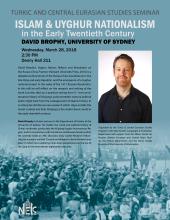Submitted by Selim S. Kuru
on
NOTE THE ROOM CHANGE: THIS LECTURE WILL BE IN ALLEN AUDITORIUM
ISLAM & UYGHUR NATIONALISM
in the Early Twentieth Century
David Brophy, University of Sydney
Wednesday, March 28, 2018
2:30 PM
Allen Auditorium
David Brophy’s Uyghur Nation: Reform and Revolution on the Russia-China Frontier (Harvard University Press, 2016) is a detailed archival study of the Russia-China borderlands in the late Qing and early Republic, and the emergence of a Uyghur national project in the wake of the 1917 Russian Revolution. In this talk he will reflect on the research and writing of the book, but also take up a question arising from it – how an alternative history of Xinjiang’s early twentieth-century political exiles might look from the vantage point of Islamic history. In so doing he will discuss new research which steps outside the Soviet context and links Xinjiang to the wider Islamic world in the early twentieth century.
David Brophy is Senior Lecturer in the Department of History at the University of Sydney. He studies the social and political history of China’s northwest, particularly the Xinjiang Uyghur Autonomous Region, and its connections with the Islamic and Russian/Soviet worlds. He currently holds an ARC Discovery Early Career Research Fellowship, for a project entitled “Empire and Religion in Early Modern Inner Asia,” in which he is exploring Inner Asian perspectives on the rise of the Qing in the seventeenth-eighteenth centuries.
Organized by the Turkic and Central Eurasian Studies Program at the Near Eastern Languages and Civilizations Department, and co-sponsored by the Ellison Center for Russian, Eastern European and Central Asian Studies, History Department and China Studies Program.
